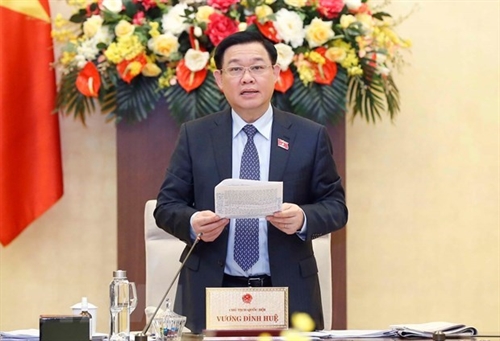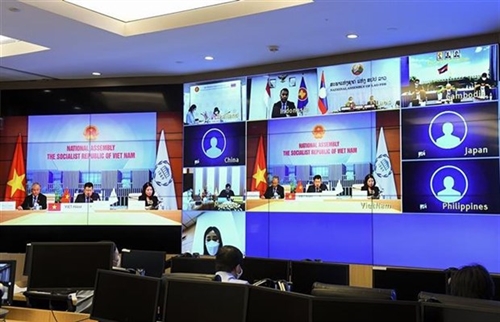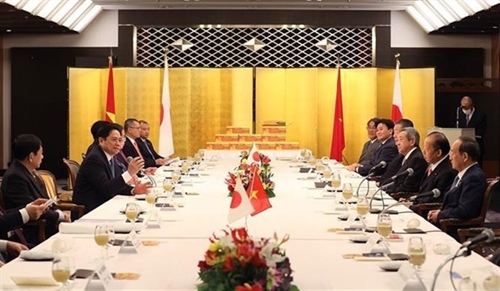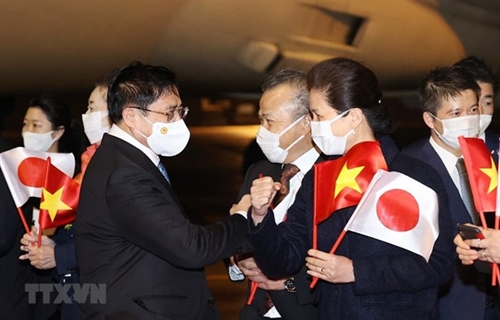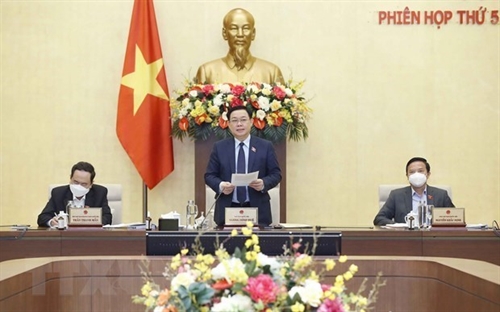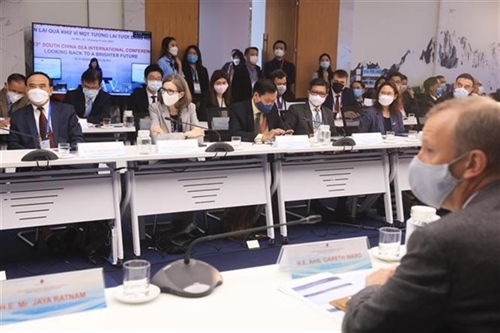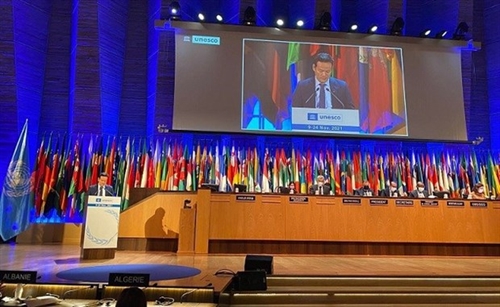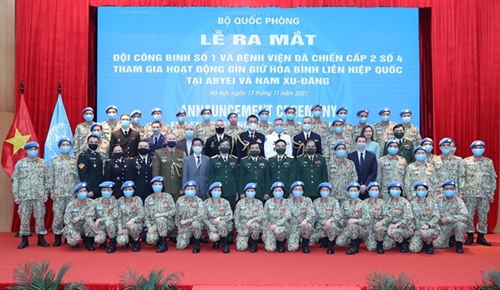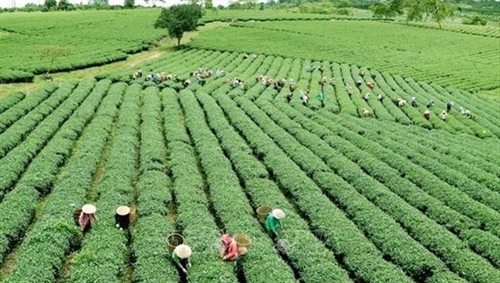How do you assess the relations between Vietnam and Japan over recent years and what do you expect in these relations in the future? Which fields of cooperation with Japan does Vietnam want to enhance?
I used to serve as President of the Vietnam - Japan Parliamentary Friendship Association and paid multiple visits to your beautiful and hospitable country in the past. It is my pleasure to make an official visit to Japan in the capacity as Prime Minister of Vietnam and to be the first foreign leader welcomed by Japan’s new administration.
Vietnam upholds the consistent foreign policy of independence, self-reliance, peace, friendship, cooperation and development, multilateral and diversified external relations, and proactive international integration in a comprehensive, extensive, and effective manner. We wish to be a friend, a trusted partner of all countries and an active and responsible member of the international community. We always attach great importance to the relationship with Japan. It is our desire to work closely with Japan to take the bilateral relations to a new level of development that is increasingly substantive and effective, for peace, stability, cooperation and prosperity in the region and the world.
As you all know, the Vietnam - Japan ties date back many centuries ago. Such ties flourished into many invaluable heritages for the present generations, a typical example of which is the city of Hoi An (Quang Nam Province). Through the ups and downs of history, Vietnam and Japan have become close friends and trusted partners of each other in various fields. Even amid the COVID-19 pandemic, the two countries managed to maintain the exchange of delegations at all levels, most notably the visit to Vietnam by former Prime Minister of Japan Yoshihide Suga in October 2020. Japan is one of Vietnam’s most important economic partners, ranking first in terms of ODA, second in terms of investment, third in terms of tourism, and fourth in terms of trade. In the meantime, Vietnam continues to be the top destination for Japanese investors. A large number of Japanese enterprises are effectively conducting business and production activities in our country. Many projects funded by Japanese ODA and investment have been making important contributions to the socio-economic development of Vietnam.
Regarding defense and security cooperation, we highly appreciate Japan’s assistance in addressing war legacy issues through its provision of grant aid for mine action programs, support for victims of Agent Orange, search and rescue training, and participation in the United Nations peacekeeping missions, among others. The two countries also engaged in exchanges and collaboration in such fields as labor, agriculture, science and technology, education and training, and climate change response. Japan and Vietnam share many cultural similarities. Hence, our people-to-people exchange is outstanding, serving as the bridge of friendship to further deepen mutual understanding, mutual trust and sincere sentiments between the two peoples. Such has laid an essential foundation for the long-lasting and sustainable development of Vietnam - Japan relations.
The profound bond between Japan and Vietnam is vividly demonstrated in times of challenge and hardship. As the COVID-19 pandemic is exerting negative socio-economic impact on all countries, Japan and Vietnam always extend to each other mutual assistance and support. Vietnam is grateful for Japan’s effective and timely support for our pandemic control efforts through its donation of over four million vaccine doses and a large amount of medical equipment and supplies. On Vietnam’s part, we have always paid due attention to Japanese nationals and businesses in Vietnam, and facilitated their business and manufacturing activities so as to sustain production and supply chains.
In the multilateral sphere, the two countries have been working closely at international and regional forums and mechanisms such as the United Nations, ASEAN, APEC, ASEM, and Mekong-Japan cooperation. Vietnam and Japan have also been making concerted efforts to address common challenges including climate change, disaster prevention and environmental protection, thereby making active contributions to regional peace, stability, cooperation and development. The two countries have been working closely with each other and with other partners to promote economic integration and free trade, expedite the signing and implementation of next-generation free trade agreements such as the Comprehensive and Progressive Agreement for Trans-Pacific Partnership (CPTPP) and the Regional Comprehensive Economic Partnership (RCEP).
To build upon our countries’ time-tested cooperation and better harness each other’s potential and strengths, Vietnam looks forward to working with Japan to enhance the effectiveness of existing cooperation mechanisms while putting forward new ones to jointly pave the way for a new development phase in the Vietnam - Japan Extensive Strategic Partnership. In such endeavors, we should strengthen bilateral collaboration in the following areas:
First, we need to focus on economic cooperation amid the COVID-19 pandemic, particularly in terms of bilateral trade. We should facilitate market access for each other’s products, thereby expediting the resumption of production and business activities, creating more jobs, and increasing income for our peoples. In addition, we call on, and will continue to create the most favorable conditions to attract financial resources, investment and ODA from Japan by offering large enough packages, preferential policies, and the most flexible and simple procedures, conducive to our present demand for rapid socio-economic recovery in the post-pandemic period. We should focus on cooperation in promoting economic recovery, strategic infrastructure development, healthcare, high-quality human resources development, digital transformation, digital economy, and climate change countermeasures.
Second, we should bolster health cooperation, especially technology transfer in the production of COVID-19 vaccines and therapeutics. Other areas of cooperation include pharmaceutical industry development, studying the establishment of Biosafety Level 4 laboratories, capacity building for hub medical institutions, investment in and upgrade of major Vietnamese hospitals such as Cho Ray, Bach Mai and 108 Military Central Hospitals.
Third, we should step up collaboration in education and training, labor, human resources development, and science and technology. It is also essential that we promote exchanges between local authorities, cultural exchange, and people-to-people exchange.
Fourth, we should enhance cooperation in culture and tourism. Our two countries’ similarities and long-lasting ties in culture, our close bond of friendship, mutual trust and mutual understanding are the precious values that both sides need to uphold. In the future, we will continue to strengthen cooperation in culture and tourism, particularly through promoting tours to famous landmarks in both countries and organizing cultural exchange events to deepen our mutual understanding and friendship.
Fifth, we should enhance cooperation in defense and security, including through fulfilling agreements on the transfer of defense equipment and technology, patrol vessels, addressing war legacy issues, search and rescue operations, among others.
Sixth, we should promote close collaboration and sharing of views on regional and international issues of mutual interest. It is necessary to step up comprehensive cooperation in all areas along with the coordination to organize commemorative activities on the 50th anniversary of diplomatic relations between Vietnam and Japan (1973 - 2023).
The people of Vietnam have always had great sentiment for, appreciation of, and trust in Japan and its people. I am confident that given the collective efforts, solidarity and mutual trust from both sides, Vietnam and Japan will continue to uphold the good momentum of the Extensive Strategic Partnership for Peace and Prosperity in Asia, thereby making active contributions to peace, stability, cooperation, and development in the region and the world.
Amid the complicated development of the COVID-19 pandemic, Vietnam has had to implement strong and resolute prevention and control measures. However, these measures have affected operation of foreign businesses and investors, including those from Japan. How does Vietnam commit to improve the investment and business environment in order to encourage foreign governments and businesses to continue considering Vietnam an attractive destination in the long term?
We recently witnessed the wide and dangerous spread of the Delta variant and its deadly attack on densely populated cities and major industrial parks along with the shortage of vaccines and medications. Amid this complicated development of the pandemic, we had to implement all possible measures to contain it, including administrative ones, with the notion that the life and safety of the people are the first and ultimate priority. To date, thanks to the efforts of the entire political system, the whole-of-people approach, the accumulated experience in pandemic control, and the assistance from friends, partners, and business communities at home and abroad, particularly that of Japan, Vietnam has fundamentally managed to overcome this most challenging and difficult period. We have also transitioned from the “zero-COVID” policy to the one of “safe and flexible adaption to and effective containment of COVID-19 along with socio-economic recovery and development.” This has proven to be a step in the right direction, to which encouraging progress in economic recovery showcased through the economic indices in the past two months following such a transition is a vivid testament. We utilize a whole-of-people approach, with the people and businesses serving as the goal, the focus and the actors in COVID-19 response and socio-economic recovery.
The Government of Vietnam has always shared the difficulties faced by businesses. Recently, I had a meeting with foreign-owned businesses and business associations, including Japanese enterprises, to listen to their opinions and proposals. To better attract foreign investors including those from Japan to continue their operation or set up new business in Vietnam, we are focusing on a number of policy orientations to improve our business and investment environment, including the following:
First, we are focusing on maintaining political stability and social safety and order, ensure an environment of peace and stability conducive to cooperation and development. Vietnam’s consistent position is to maintain macroeconomic stability with a view to encouraging foreign investors to do business in Vietnam.
Second, we are striving to improve governance, sectoral governance, complete institutions, revise laws and regulations towards enhanced decentralization, delegation of power, minimizing procedures pertaining to business and investment activities of enterprises, and reducing the processing time and cost of administrative procedures, among others.
Third, we are working to immediately address outstanding bottlenecks facing business associations, including the Japanese Business Association in Vietnam, so as to recover supply chains, ensure the flow of goods, and resume business and production activities in the new normal. The Government of Vietnam pledges to protect the lawful and legitimate rights and interest of investors. In this connection, we have established an Adhoc Working Group to address challenges facing businesses.
Fourth, we are assisting the people and businesses to promote business and investment activities and stabilize their lives through activities including, among others, taxes and fees reduction and exemption, reducing power and telecommunication tariff reduction, resumption of international flights and finalization of new entry procedures.
Fifth, we are vigorously stepping up investment in strategic infrastructure. We call on investment from foreign and private investors, particularly through public-private partnership, in infrastructure, digital transformation, green growth, and climate action.
Sixth, we will continue to promote human resources development, giving priority to digital capacity building and training of a workforce with high expertise.
Let me take this opportunity to express my thanks and appreciation to the Japanese Government, people, and businesses for the assistance extended to Vietnam in our pandemic control efforts, and for your generous donation to the Vietnam Vaccine Fund. This bears vivid testament to the trusted and sincere friendship between our two countries, true to the spirit of “harmonized interests and risk sharing."
Japan is receiving many laborers and students from Vietnam and they have become important members of the Japanese society. What do you expect from Japan to deepen the relations between the two countries through this system of human resources exchange?
The Vietnamese community is currently the second largest overseas community in Japan with more than 450,000 people, in which the number of trainees increased rapidly with 200,000 people, ranking first in terms of the number of foreign trainees in Japan. This is an important human resource for Vietnam which also contributes to Japan's socio-economic development. They also serve as the bridge of friendship contributing to greater mutual understanding, trust, affection and sincerity between our two peoples. The Vietnamese community is also an important foundation for the sustainable development of bilateral relations.
As Japan has started to ease entry regulations from November 2021, we hope Japan will create favorable conditions for Vietnamese trainees who have already obtained visas to enter Japan, and at the same time continue to support the Vietnamese community who reside, study and work in Japan, address their emerging issues to encourage their contributions to the development of their local communities as well as the advancement of Vietnam - Japan cooperation and friendship.
Due to the COVID-19 pandemic, many Vietnamese citizens have been stranded in Japan. What has the Vietnamese Government done and will do to help them soon return to Vietnam?
The Vietnamese Government and respective ministries and agencies have been doing their utmost to undertake measures to support and protect Vietnamese citizens in Japan. To date, many repatriation flights have been organized to bring our citizens home. We will continue to work closely with the Japanese side to raise awareness among the Vietnamese community in Japan on the need to observe local laws and regulations, as well as to effectively address emerging issues pertaining to them.
Let me take this opportunity to thank Japan for the invaluable and substantial assistance extended to the Vietnamese community in Japan and Vietnamese nationals affected by the COVID-19 pandemic as a whole. I am confident that given the efforts of both sides, the Vietnamese community in Japan will continue to flourish, thereby playing a key role in promoting people-to-people exchanges, for the benefits of the two countries.
We understand that issues relating to environment such as climate change and plastic waste in the ocean are also among great concerns of Vietnam and the international community has recently discussed measures at a global level. In your opinion, how can Japan support Vietnam in this field?
As a country heavily affected by climate change, Vietnam always gives priority to cooperation in climate change response and environment protection. With a high sense of responsibility, Vietnam made strong commitments at the 26th Conference of the Parties to the United Nations Framework Convention on Climate Change (COP26). We affirmed our pledge to develop and implement stronger measures to reduce greenhouse gas emissions based on our own resources and with the cooperation and support of the international community to achieve net-zero emissions by 2050. Vietnam is also a party to the Global Methane Pledge, the Glasgow Leaders' Declaration on Forests and Land Use, and the Global Coal to Clean Power Transition Statement.
To implement these strong commitments, we will review, amend and implement relevant economic development strategies and plans, including those on green growth and circular economy. At the same time, Vietnam wishes to cooperate with countries, including Japan, especially in such fields as financial mobilization, technology transfer, energy, transportation, waste management, agriculture and capacity building. The two countries also need to effectively realize ongoing projects in the areas of environment, climate change response, integrated management of seas and islands, hydro-meteorology and disaster prevention, land management, water resources and Mekong cooperation, just to name a few.
I am convinced that our two countries have enormous opportunities and potential for deepening cooperation for mutual benefit and contributing to concerted global efforts in environmental protection and climate change response.- (VNS/VLLF)
